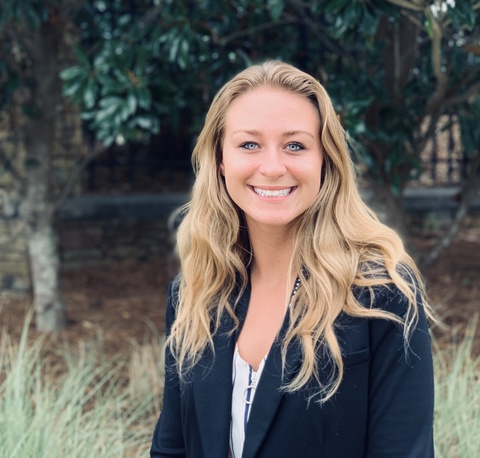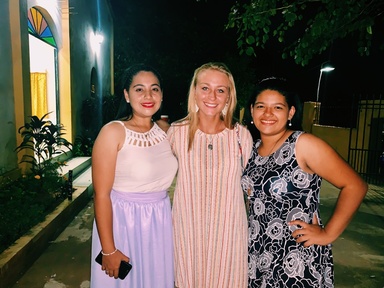
Hannah Baysinger had forty-eight hours to leave Paraguay. She had been in the South American country as a Peace Corps volunteer for just six months when the pandemic forced her and other volunteers to leave at the end of March 2020. “I was on the last commercial flight out of Paraguay, and one of the last out of South America,” says Baysinger of the sudden departure she made from a place she intended to call home for two years.
Having gone straight from her undergraduate experience at Iowa State University (where she triple-majored in Global Resource Systems, Environmental Studies, and World Languages and Culture) to Paraguay, Baysinger didn’t have a scenario for what came next. “Next” was serving as a Community Environment Promoter in the Peace Corps’ Environment Conservation Sector. It was about learning Guarani, the language spoken in rural areas of the country. And it was a dedication to connect deeply with the community of approximately 300 people where she was living, as well as with other volunteers.
Choosing a path in the midst of a pandemic
To be suddenly pushed out of that narrative was, understandably, demoralizing and confusing. “When I got home to Marion, I had to quarantine for 14 days,” says Baysinger, “which was okay because I was pretty emotional and needed to process what I’d just gone through.”
Rather than wait for the pandemic to lift or shift enough for her to return—which just seemed too unpredictable—she identified the part of her experience in Paraguay she’d most enjoyed. Just before the evacuation, she worked with high school students to create an environmental curriculum for younger kids. Simultaneously, the job she’d taken in Cedar Rapids as a youth counselor at a foster home provided her a chance to interact with the teachers who were working with a high-risk population. Excited by what they were doing, she became confident of her next step: a graduate program in teaching.

Starting in spring semester 2021, Baysinger entered the University of Iowa’s Masters of Teaching program in World Language Education with endorsements in Spanish and English as a Second Language (ESL). She was drawn to the UI’s program because of her intention to eventually pursue a PhD: “I knew that the MAT and the endorsements would open up different doors specific to research.”
Spelman Rockefeller's support for children and families
As this year’s Obermann Spelman Rockefeller Community Scholar, Baysinger is beginning to discern future research questions. The position, which was started last year in response to community needs during the pandemic, puts a UI graduate student in a quarter-time position with a local nonprofit that serves the well-being of children and families. It is funded via money originally donated to the University in 1929 via the philanthropist Laura Spelman Rockefeller to establish “child study” centers at several major universities. When the UI center that oversaw these funds closed, the Obermann Center became the steward and currently uses the funding to support two initiatives—a graduate research assistant and an additional Summer Interdisciplinary Research Grant for faculty members working in the area of children and family welfare.
Baysinger is working with Open Heartland, a community-based initiative that serves Latino immigrant families living in Johnson County, many of whom have escaped violence, extreme poverty, and lack of educational and health resources. Since the pandemic, Open Heartland has grown in response to the needs of the community it serves. When schools closed, it opened its doors to provide WiFi for online learning and in-person tutoring. The community opened a tienda in the space to buy and sell food, furniture, clothing, and handmade goods. Under the guidance of Open Heartland director Deb Dunkhase, stronger ties have been developed with other organizations, especially ones that provide services such as medical care and legal advice.
Baysinger volunteered at Open Heartland last spring as a tutor. She was struck by what a strong community it is: “They’re really a family who make sure that everyone is okay and has what they need.” When the graduate assistant position opened, she knew it was a place where the program coordination skills she’d built in the Peace Corps and her experience as an experienced Spanish speaker could be put to good use. Utilizing the teaching strategies she is learning in her own graduate classes, she is developing curricula for events for some of the children at Open Heartland.
Serving local Spanish-speaking kids
“I see a lot of needs for basic resources, many of which revolve around language,” she says of Open Heartland participants. “This includes having the language skills for a parent to sign up their child for school, or for kids who know basic English to have the skills and confidence to succeed in academic English.”
The experience is already planting seeds for what’s next. Baysinger is certain that she wants to work in a school for a while, likely in ELL, but then she wants to dive deeper into how second languages are taught. This year’s experience will be a chance for her learn on the ground, establish deep community contacts, and test these practical experiences against the new skills and theories she’s acquiring as a student.